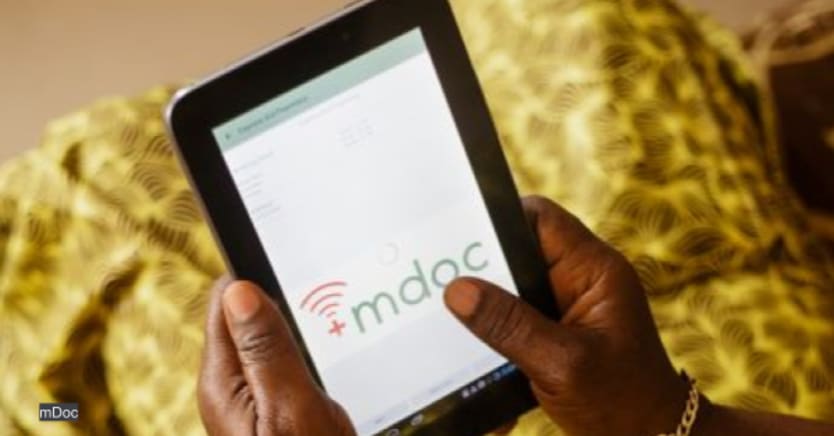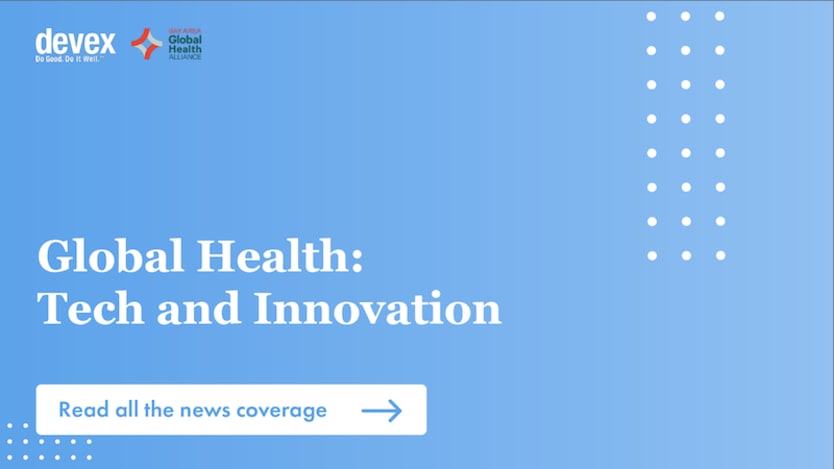
mDoc, a health company that uses “digital nudges” to encourage healthier habits in people living with or at high risk of chronic disease, saw a major change in its interactions with users in Nigeria as the COVID-19 pandemic disrupted their regular care.
“They started calling us,” said Dr. Nneka Mobisson, mDoc’s co-founder and chief executive officer. “It was no longer just about my hypertension. It became, ‘I’m bleeding. I’ve gone to the hospital, and the gate is closed, and they’re not seeing me. What do I do?’”
Visit the HealthTech Dialogue Hub series for more coverage on how to catalyze AI-driven solutions for health and care delivery. You can join the conversation using the hashtag #HealthTech.
The trend raised questions for the mDoc team about how to build connections with pharmacies, providers, and others in order to bridge the gaps that patients experience between self-care and professional care, Mobisson said Wednesday during “Stopping the Syndemic: The role of tech to ensure cardiovascular health in the COVID-19 era,” a virtual event hosted by Devex in partnership with the Novartis Foundation.
The pandemic has resulted in severe disruptions to basic health services needed to prevent, diagnose, and treat patients with noncommunicable diseases, including heart disease. For example, at the height of the crisis, countries saw partially or completely disrupted services for cardiovascular care, leading to delays in preventive screenings, postponement of surgeries, and excess deaths from heart attacks and other emergencies.
But the pandemic has also accelerated the pace of progress for digital health technologies — with benefits for health workers and patients alike. For example, there has been a dramatic increase in the use of telemedicine, with 42% of low- and middle-income countries now using these services to replace in-person consultations, according to the World Health Organization. This creates an opportunity for the global health community to leverage increased use of, and trust in, virtual health care in order to improve cardiovascular health.
mDoc has emerged from the pandemic with three insights on the ways that digital tools can be leveraged to serve vulnerable populations, Mobisson said.
First is the importance of investing in users’ trust through personalized digital interactions on whatever platform they prefer. Second is the importance of building digital literacy. While mDoc started with a web-based platform, it found that even some users who have smartphones say they prefer to communicate via SMS.
“The reality is smartphone penetration rates and mobile phone penetration rates are not appropriate proxies for digital literacy,” she said.
Third is the importance of investing in self-efficacy so that people feel enabled to make the lifestyle changes to improve their cardiovascular health.
Community health workers can be a major asset in the data collection needed to transform health systems from being reactive to predictive, said Dr. Edson Amaro Jr., a neuroradiologist and head of big data analytics at Albert Einstein Hospital in Brazil.
“If you’re from the same community, it’s easier for you to understand people’s story, because you know their lives,” he said at the event. “They’re your neighbors.”
While many of Brazil's community health workers had never touched a screen until they first received computer tablets to support their work, they now use them every day, drawing on tech as well as the trust they have earned in their communities to ensure access to care.
The pandemic led governments to fast-track tech-related health policy changes — albeit sometimes temporarily — to allow for things like electronic prescriptions, said Farouk Meralli, founder and chief executive officer at mClinica, which connects pharmacies across Southeast Asia on a common platform.
Suddenly, mClinica went from “light work with government” to “working with every ministry of health in every country” as “governments were making decisions in days that would normally take months and years,” he said. It provided digital training for its network of pharmacy professionals, worked on digital supply chain solutions to ensure that pharmacies facing shortages could get products back on their shelves, and strengthened digital patient management.
These services will be essential as pharmacies see an increase patients who might otherwise visit clinics and hospitals, Meralli said. Between visits to the pharmacist, patients can leverage digital tools to manage their own health.
But one of the major limits to self-care in cardiovascular health is that it requires devices such as blood pressure monitors, Mobisson noted. That is particularly challenging in low- and middle-income country contexts, where people may not be able to afford these devices at home and live far from facilities where they can access them.
Before the pandemic, mDoc had mapped the pharmacies that allowed people to walk in and track their metrics. It also set up “nudge hubs,” or kiosks where people could learn how to access care through their mobile phones. Many of these services have gone away over the past year, and users are asking for their return.
Mobisson said this is just one example of the need to identify the gaps in an individual’s journey, from self care to professional care, then make investments in technologies “to ensure that gap is closed.”
This coverage, presented by the Bay Area Global Health Alliance, explores the intersection between technology, innovation, and health. How are tech, innovation, and cross-sector partnerships being leveraged to accelerate equitable access to health care?









